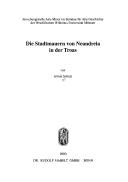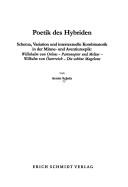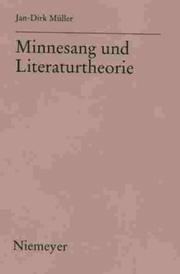| Listing 1 - 10 of 10 |
Sort by
|

ISBN: 9783774929661 3774929661 Year: 2000 Publisher: Bonn Habelt
Abstract | Keywords | Export | Availability | Bookmark
 Loading...
Loading...Choose an application
- Reference Manager
- EndNote
- RefWorks (Direct export to RefWorks)
City walls --- Excavations (Archaeology) --- Murs d'une ville --- Fouilles (Archéologie) --- Neandria (Extinct city) --- Troas (Turkey) --- Neandria (Ville ancienne) --- Troade (Turquie) --- Antiquities --- Antiquités --- -Excavations (Archaeology) --- -Archaeological digs --- Archaeological excavations --- Digs (Archaeology) --- Excavation sites (Archaeology) --- Ruins --- Sites, Excavation (Archaeology) --- Archaeology --- Village walls --- Fortification --- Walls --- The Troad (Turkey) --- Troad, The (Turkey) --- Turkey --- -Neandria (Extinct city) --- Neandria (Extinct city). --- Troas (Turkey). --- Fouilles (Archéologie) --- Antiquités --- Archaeological digs

ISBN: 3503049649 9783503049646 Volume: 161 Publisher: Berlin Erich Schmidt verlag
Abstract | Keywords | Export | Availability | Bookmark
 Loading...
Loading...Choose an application
- Reference Manager
- EndNote
- RefWorks (Direct export to RefWorks)
Epic poetry, German --- -German literature --- -German poetry --- German epic poetry --- German poetry --- History and criticism --- German literature --- History and criticism. --- Epic literature [German ] --- Middle High German, 1050-1500 --- Narration (Rhetoric) --- Epic poetry, German - History and criticism. --- German poetry - Middle High German, 1050-1500 - History and criticism. --- German literature - Middle High German, 1050-1500 - History and criticism.
Book
ISBN: 3830002238 Year: 2000 Publisher: Hamburg : Kovač,
Abstract | Keywords | Export | Availability | Bookmark
 Loading...
Loading...Choose an application
- Reference Manager
- EndNote
- RefWorks (Direct export to RefWorks)
Book
ISBN: 0262037602 0262345269 9780262345262 9780262037600 0262345277 9780262546737 Year: 2018 Publisher: Cambridge, Mass. The MIT Press
Abstract | Keywords | Export | Availability | Bookmark
 Loading...
Loading...Choose an application
- Reference Manager
- EndNote
- RefWorks (Direct export to RefWorks)
An argument that representational decision making is more cognitively efficient, allowing an organism to adjust more easily to changes in the environment.
Decision making. --- Human behavior. --- Behavioral assessment. --- COGNITIVE SCIENCES/General --- PHILOSOPHY/General --- BIOMEDICAL SCIENCES/General --- Assessment of behavior --- Behavior assessment --- Behavioral analysis --- Behavioral evaluation --- Psychodiagnostics --- Psychology --- Action, Human --- Behavior, Human --- Ethology --- Human action --- Human beings --- Human biology --- Physical anthropology --- Social sciences --- Psychology, Comparative --- Deciding --- Decision (Psychology) --- Decision analysis --- Decision processes --- Making decisions --- Management --- Management decisions --- Choice (Psychology) --- Problem solving --- Methodology --- Behavior --- Decision making --- Cognitive psychology
Book
ISBN: 1003030246 1000067238 1003030246 Year: 2020 Publisher: New York, NY : Routledge,
Abstract | Keywords | Export | Availability | Bookmark
 Loading...
Loading...Choose an application
- Reference Manager
- EndNote
- RefWorks (Direct export to RefWorks)
This book is the first systematic treatment of the philosophy of science underlying evolutionary economics. It does not advocate an evolutionary approach towards economics, but rather assesses the epistemic value of appealing to evolutionary biology in economics more generally. The author divides work in evolutionary economics into three distinct, albeit related, forms: a structural form, an evidential form, and a heuristic form. He then analyzes five examples of work in evolutionary economics falling under these three forms. For the structural form, he examines the parallelism between natural selection and economic decision making, and the parallelism between natural selection and market competition. For the evidential form, he looks at the relationship between animal and human economic decision making, and the evolutionary explanation of diversity in human economic decision making. Finally, for the heuristic form, he focuses on the plausibility of equilibrium modeling in evolutionary ecology and economics. In this way, he shows that linking evolutionary biology and economics can make for a powerful methodological tool that can enable progress in our understanding of various economics questions. Structure, Evidence, and Heuristic will be of interest to scholars and advanced students working in philosophy of science, philosophy of social science, evolutionary biology, and economics.
Book
ISBN: 9783484891357 Year: 2008 Publisher: Tübingen Max Niemeyer
Abstract | Keywords | Export | Availability | Bookmark
 Loading...
Loading...Choose an application
- Reference Manager
- EndNote
- RefWorks (Direct export to RefWorks)
Book
ISBN: 9783110240382 3110240386 3110288869 9786613939937 3110240394 1283627485 9783110240399 9781283627481 6613939935 Year: 2012 Publisher: Berlin De Gruyter
Abstract | Keywords | Export | Availability | Bookmark
 Loading...
Loading...Choose an application
- Reference Manager
- EndNote
- RefWorks (Direct export to RefWorks)
Dass die Erzähltheorie zu historisieren sei, ist immer wieder gefordert worden. Im Bereich vormoderner und besonders mittelalterlicher Literatur liegt inzwischen eine schwer überschaubare Fülle von Einzelstudien vor, die überzeugende Zugänge gefunden haben, um die mitunter befremdliche Andersheit der Narration zu begreifen und für weiter gehende Textinterpretationen zu nutzen. Die Erzähltheorie in mediävistischer Perspektive unternimmt den erstmaligen Versuch, die vorhandenen Ansätze zu bündeln und fortzuführen, daneben auch Lücken in der bislang erarbeiteten Systematik aufzufüllen. Sie soll als handbuchartiges Überblickswerk für narratologisch interessierte Mediävisten und fortgeschrittene Studierende dienen. Von besonderem Interesse sind die Semantiken, die über das Erzählen vermittelt werden: in impliziten Gattungsentwürfen, Erzählschemata, gängigen Themen und Motivkomplexen, Bezügen zum zeitgenössischen kulturellen Wissen, Raum- und Zeitkonzeptionen, Verknüpfungsregeln, Erzählerentwürfen.
Narration (Rhetoric) --- Literature, Medieval --- History --- History and criticism. --- Narration (Rhetoric). --- Narrative. --- Medieval German Literature. --- Medieval Studies. --- Middle Ages/Literature. --- Narrative Theory. --- Narratology.
Book
ISBN: 9783110400144 9783110419696 9783110419801 Year: 2015 Publisher: Berlin De Gruyter
Abstract | Keywords | Export | Availability | Bookmark
 Loading...
Loading...Choose an application
- Reference Manager
- EndNote
- RefWorks (Direct export to RefWorks)
This book is a systematic compendium of research on the otherness of medieval narrative. It particularly examines how forms of narrative are linked to narrative meaning. Covered themes include genre, patterns of narration, connections to contemporary world knowledge, spatial and temporal models, relationships to plot, and narrative drafts. The text has been revised once again for the student edition.
Narration --- Littérature médiévale --- Histoire et critique --- German literature --- Fiction --- Literary rhetorics --- Histoire et critique.

ISBN: 3484108371 3110915316 Year: 2001 Publisher: Tübingen : Niemeyer,
Abstract | Keywords | Export | Availability | Bookmark
 Loading...
Loading...Choose an application
- Reference Manager
- EndNote
- RefWorks (Direct export to RefWorks)
The volume assembles all the studies on Minnesang published so far by Jan-Dirk Müller. Their common denominator is the combination of literary theory and the historical perspective on Minnesang, with constant reference to specific examples. The impulses emanating from New Philology prove to have a genuine bearing on Minnesang by virtue of the emphasis on the intrinsic logic of different versions. Other approaches shown to provide valuable insights on this body of literature are the social history perspective, discourse analysis, and aspects of the deconstructivist paradigm.
Minnesang --- Minnesingers --- German poetry --- Minnesingers. --- History and criticism. --- Musicians --- Poets --- Courtly love --- Meistersinger --- Literaturtheorie
Book
ISBN: 3110419696 3110419807 3110400146 Year: 2015 Publisher: Berlin, [Germany] ; Munich, [Germany] ; Boston, [Massachusetts] : De Gruyter,
Abstract | Keywords | Export | Availability | Bookmark
 Loading...
Loading...Choose an application
- Reference Manager
- EndNote
- RefWorks (Direct export to RefWorks)
Dass die Erzähltheorie zu historisieren sei, ist immer wieder gefordert worden. Im Bereich vormoderner und besonders mittelalterlicher Literatur gibt es inzwischen eine schwer überschaubare Fülle von Einzelstudien, die überzeugende Zugänge gefunden haben, um die mitunter befremdliche Andersheit der Narration zu begreifen und für weiter gehende Textinterpretationen zu nutzen. Die Erzähltheorie in mediävistischer Perspektive unternimmt den erstmaligen Versuch, die vorhandenen Ansätze zu bündeln und fortzuführen, daneben auch Lücken in der bislang erarbeiteten Systematik aufzufüllen. Von besonderem Interesse sind die Semantiken, die über das Erzählen vermittelt werden: in impliziten Gattungsentwürfen, Erzählschemata, gängigen Themen und Motivkomplexen, Bezügen zum zeitgenössischen kulturellen Wissen, Raum- und Zeitkonzeptionen, Verknüpfungsregeln, Erzählerentwürfen. Die Erzähltheorie in mediävistischer Perspektive hat sich innerhalb kurzer Zeit als handbuchartiges Überblickswerk für narratologisch interessierte Mediävisten und fortgeschrittene Studierende etabliert und liegt nun als durchgesehene Studienausgabe vor.
Narration (Rhetoric) --- Literature, Medieval --- History --- History and criticism. --- Narrative (Rhetoric) --- Narrative writing --- Rhetoric --- Discourse analysis, Narrative --- Narratees (Rhetoric)
| Listing 1 - 10 of 10 |
Sort by
|

 Search
Search Feedback
Feedback About UniCat
About UniCat  Help
Help News
News